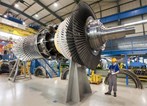Another Success For Siemens Power Plant Technology In South Korea

Company supplies H-Class technology for power plant with district heat extraction in Daegu Metropolitan City
Erlangen Germany - Siemens has received its fifth order for H-Class power plant technology from South Korea. The customer is the South Korean company Lotte Engineering and Construction (Lotte E&C), which has been contracted to build the combined-cycle power plant Daegu Innovation City CHPP for Daegu Green Power (DGP). DGP is a joint venture company comprising Korean power provider Southern Power (KOSPO), Lotte E&C, BHI and Daegu National Gas. A long term service contract with DGP has also been signed. The combined-cycle plant will be designed for the combined generation of heat and power and will be able to supply households in the region with district heat. The natural-gas-fired plant will achieve a gross installed electrical capacity of 415 megawatts and an efficiency of over 61 percent. With district heating, fuel efficiency will increase to over 80 percent. Commissioning is scheduled for late 2014.
The combined-cycle power plant Daegu Innovation City will be built in Daegu Metropolitan City 240 km south-east of the capital city of Seoul. The Siemens scope of supply comprises a power island which includes an SGT6-8000H gas turbine, an SST6-5000 steam turbine and condenser, an SGen6-2000H hydrogen-cooled generator and a Benson heat recovery steam generator. Siemens will also supply the electrical system and the SPPA-T3000 I&C system, as well as parts of the auxiliary and ancillary systems. Siemens will also be responsible for the complete design of the power plant and will also supervise assembly and commissioning. The new plant will feature the proven single-shaft configuration, in which gas turbine, steam turbine and generator are all arranged on one shaft. The steam turbine and generator will be connected by a self-synchronizing clutch. In order to ensure the reliability and availability as well as the economic operation of the power plant a 10 year long term maintenance contract has also been signed.
South Korea, and especially the region around Daegu Metropolitan City, is currently experiencing a high level of economic growth. More and more power generation units are being built at existing power plant sites in cities throughout Korea in order to satisfy the growing demand for electricity. Power plants with high power density are becoming increasingly important as the country attempts to optimize use of its limited amount of space. The H-class power plant technology has a further advantage over smaller gas turbine performance classes in this respect.
The country is low in energy resources and is consequently the second largest importer of liquid natural gas worldwide. "The efficiency of the energy conversion process has become extremely important due to the very high gas prices. Siemens supplies the most efficient tried-and-tested power plant technology currently available on the market and has proven itself to be an experienced and reliable partner in power plant projects in Korea. We are glad that we can rely on Siemens technology and experience for this project", says Eusik Son, Executive Vice President at Lotte E&C.
"The new order from South Korea shows that there is a high demand for high-performance power plants. We have already sold 16 of these gas turbines worldwide since the first commercial order in 2010 – eight in South Korea alone. For us this is a further confirmation that we launched our new, highly efficient gas turbine on the market at exactly the right moment", says Lothar Balling, Head of Gas Turbine Power Plant Solutions at the Siemens Fossil Power Generation Division.
High-efficiency combined-cycle power plants (CCPP) are part of Siemens' Environmental Portfolio. In fiscal 2011, revenue from the Portfolio totaled about €30B, making Siemens one of the world's largest suppliers of ecofriendly technologies. In the same period, our products and solutions enabled customers to reduce their carbon dioxide (CO2) emissions by nearly 320 million tons, an amount equal to the total annual CO2 emissions of Berlin, Delhi, Hong Kong, Istanbul, London, New York, Singapore and Tokyo.
Source: Siemens Energy Sector
